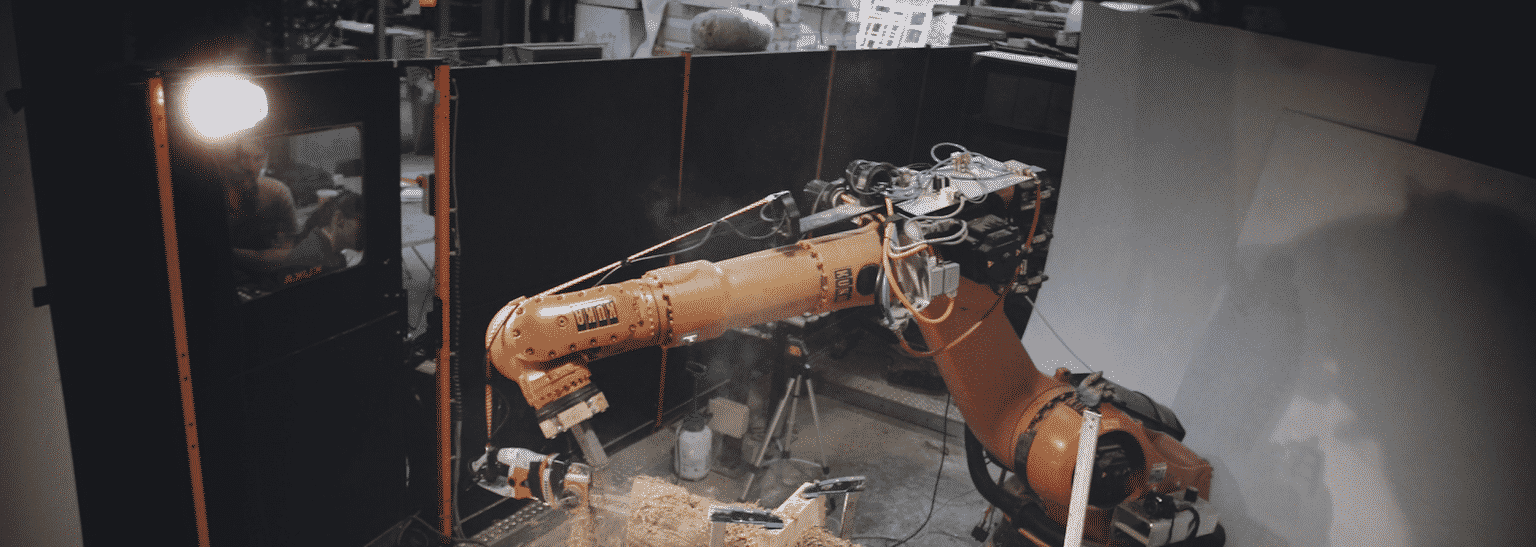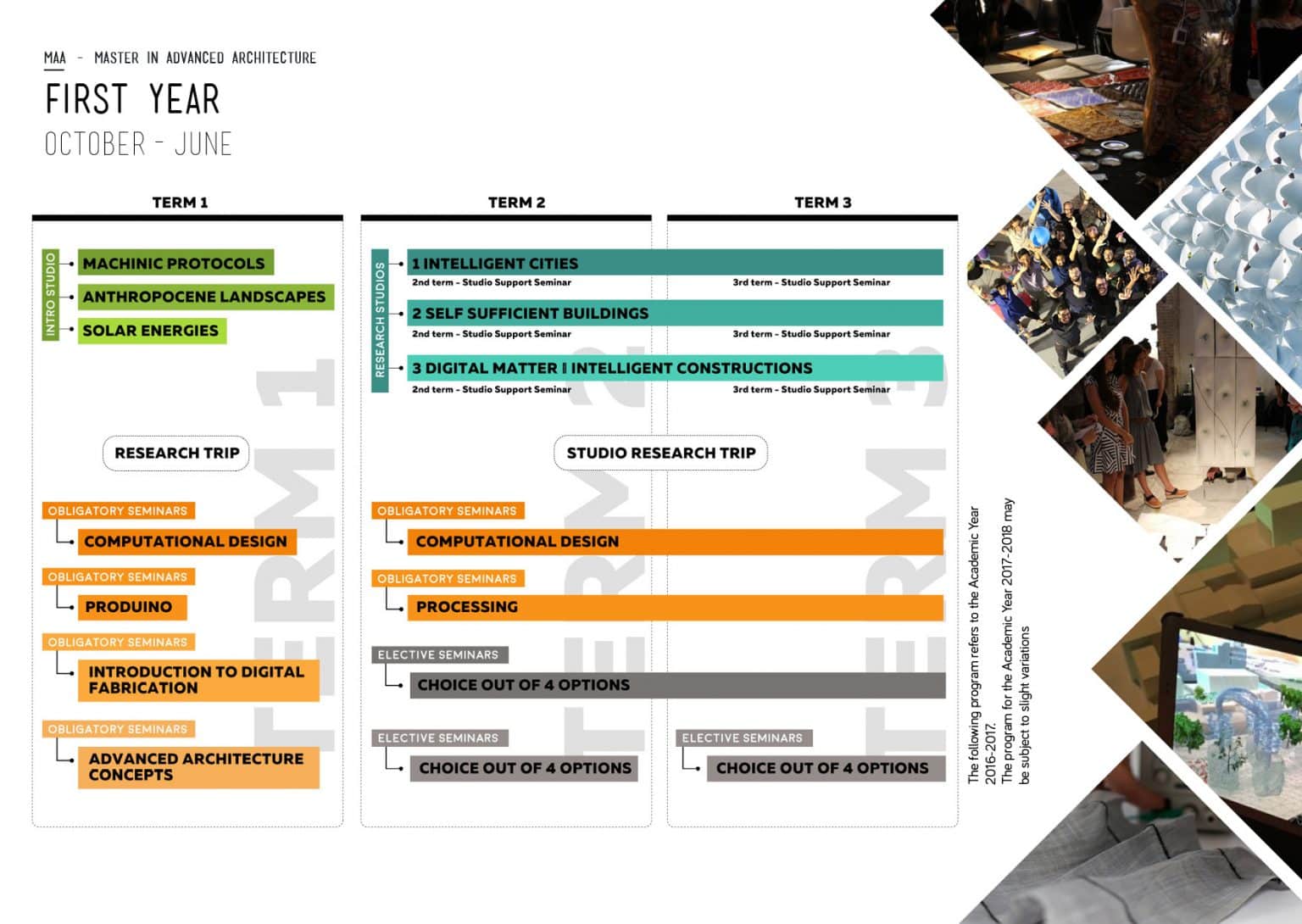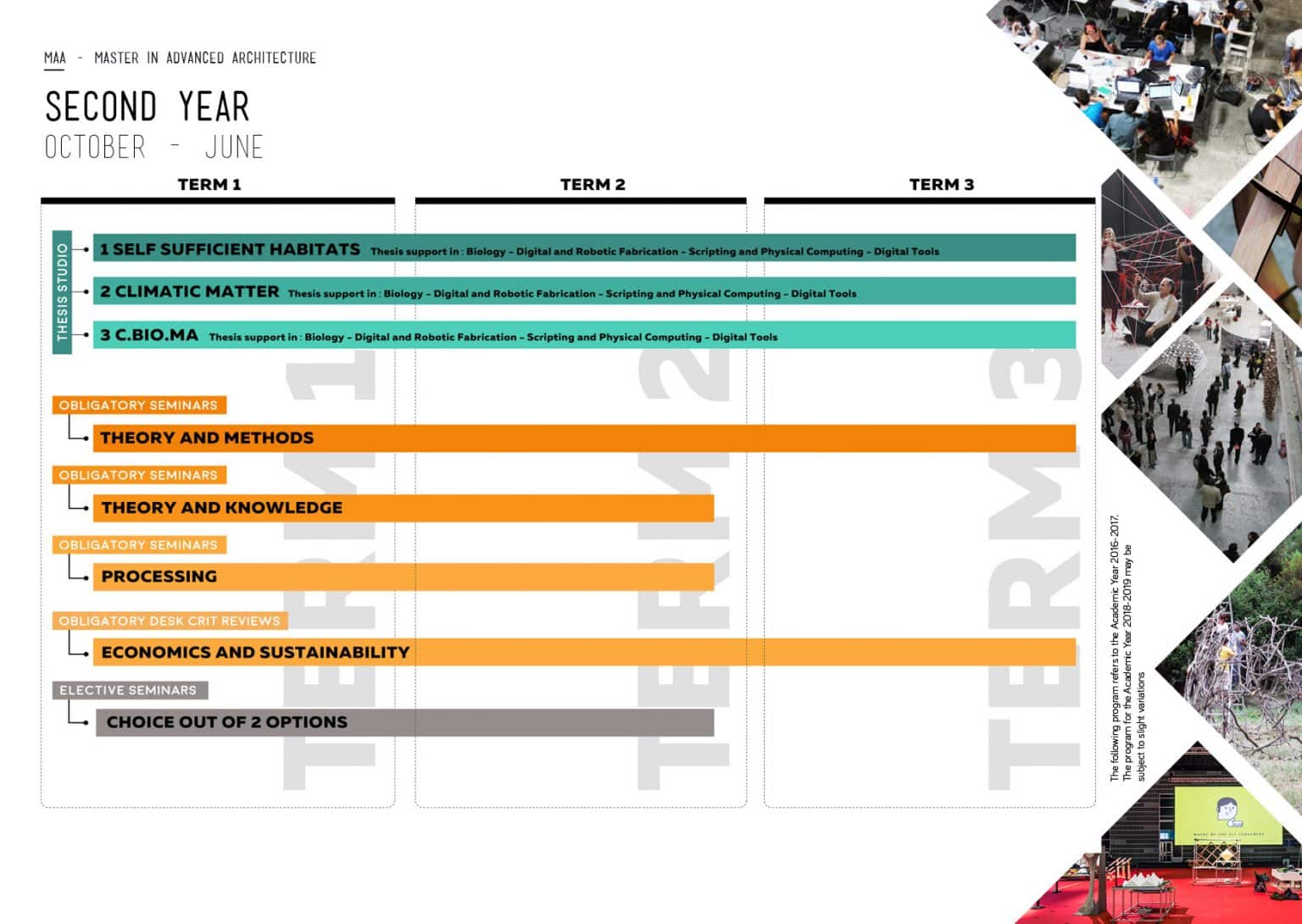IAAC offers in Barcelona an international Master programs in Advanced Architecture (MAA), oriented to architects, engineers and designers from all over the world eager to imagine the future of our cities and societies and committed to build it in the present.

MAA IN BRIEF
| Edition | 17th edition | 8th edition |
| Degree | Master in Advanced Architecture accredited by School of Professional and Executive Development at the Polytechnic University of Catalonia – European Higher Education Area (EHEA) | |
| Credits | 75 ECTS | 130 ECTS |
| Duration | 9 Months – From October 2017 to June 2018 // Full Time | 18 Months – From October 2017 to June 2019 // Full Time |
| Language | English | English |
| Tuition Fee | 18.750€ | 30.465€ |
| Admission | Architecture degree, Bachelor or higher degree from other related professions. | |
Being the first Master in Advanced Architecture of the world, the IAAC’s MAA has now reached its 17th edition. During this time IAAC has received and been home to over 1000 students from more than 70 countries, making it an exceptionally international and multicultural place.
In the version of 9 months (MAA01) or 18 months (MAA02) the Master in Advanced Architecture is accredited by the Universidad Politècnica de Catalunya (UPC) with 75 ECTS and 130 ECTS respectively. The MAA is directed by the architect and researcher Areti Markopoulou.
The Master in Advanced Architecture program emerges as an innovative open structure focusing on three select Research Lines (Intelligent Cities, Self-sufficient Buildings, Digital Matter-Intelligent Construction) all led by internationally renowned experts, and bringing together students and faculty from different disciplines and origins, towards the creation of a networked hub of excellence, the IAAC Community, dedicated to research and innovation for the habitability of the 21st Century.
CONTEXT & AGENDA
In order to allow the highest quality and applied research, the Master in Advanced Architecture proposes a multidisciplinary and multiscalar approach, considering architecture as a transversal field, for which it is imperative to integrate all research and applications with the knowledge of specialists form a diversity of fields of expertise.
In this sense the Advanced Architecture Agenda establishes the responsibility to confront the process of global urbanisation from a multi-scalar and operational perspective, as well as through the development of prototypes that promote environmental, economic and social sustainability.
In the early 20th century, the concept of ‘dwelling’ was defined as a ‘machine for living’, a reference to a new way of understanding the construction of inhabitable spaces that characterised the Machine Age.
Today, a century later, we face the challenge of constructing sustainable or even self-sufficient prototypes; living organisms that interact and interchange resources with their environment, and that function as entirely self-sufficient entities, as trees do in a field. In this way, each action in the territory implies a manipulation of multiple environmental forces, connected with numerous flows and networks such as energy, transport, logistics and information, generating new inhabitable and responsive nodes with the potential to use and produce resources.
Territorial and urban strategies as well as building operations therefore call to be coordinated processes that extend architectural knowledge to new forms of management and planning, in which multi-scalar thinking also entails an understanding of shifting dynamics, energy and information transmission, as well as continuous adaptation.
Architecture is always facing the responsibility of responding to emergent needs, technologies and ever-changing programs. We must ask more of architecture: we as architects should be required to design inhabitable organisms that are capable of developing functions and integrating the processes of the natural world that formerly took place at a distance, in other points of the surrounding territory.
The models created for the metropolis of the last century are unable to accommodate new developments linked to contemporary urban lifestyles, which ever more discontinuous in space and time. The building-over of the global landscape requires us to project at the same time the full and the empty, the natural and the artificial, in such a way as to make economic impetus compatible with sustainable development.
It is necessary to generate complex knowledge linked to a multi-layered reading of realities that have traditionally been thought of as separate, such as energy manipulation, nature, urban mobility, dwellings, systems of production and fabrication, the development of software, information networks, etc. This opens up the possibility of generating new prototypes, capable of engaging with complex and changing environments.
Finally, every new urban or architectural production needs to update its materiality and reinterpret construction techniques of the past centuries, which are very directly based on the transformation of locally available materials. It is now time for interaction between disciplines and technologies to engage in a vision that embraces different fields of research.
RESEARCH LINES
In its perspective of multidisciplinarity and transcalarity, MAA is organised in an open academic structure which combines mandatory and elective courses around different main research lines:
Research Lines for MAA01 and MAA02 (fist year)
RS1: INTELLIGENT CITIES, directed by Willy Müller
RS2: SELF SUFFICIENT BUILDINGS, directed by Enric Ruiz Geli and Mireia Luzárraga
RS3: DIGITAL MATTER, directed by Areti Markopoulou
Thesis Studios for MAA02 (second year)
TS1: SELF-SUFFICIENT HABITATS, directed by Vicente Guallart
TS2: CLIMATIC MATTER, directed by Jordi Pagés and Lluis Viu
TS3: C.BIO.MA, directed by Marcos Cruz
ACADEMIC STRUCTURE
The Master in Advanced Architecture is articulated in three different programs: MAA01, MAA01+OTF and MAA02. During the first year (October 2017 – June 2018) the students enrolled in the programs will work together in a common educational platform, with a common organization and academic structure. After the completion of MAA01, students enrolled in MAA01+OTF or MAA02 will follow two different organizations and academic structures.
MAA02 combines the first year Master with a second year of investigation to develop a thesis project. During this second year students are required to deal with a project counting on the possibility to develop it with international faculty and enterprises, highly specialized in different fields.
MAA+OTF combines MAA01 with a postgraduate program called Open Thesis Fabrication (OTF), which is an intensive applied research program that combines Academy and Industry and focus on developing innovative solutions in a wide range of fields.
MAA 01
With 7 day access to the IAAC Studio working space and its prototypes fabrication lab, students have the opportunity to be part of a highly international group, including faculty members, researchers and lecturers, in which they are encouraged to develop collective decision-making processes and materialize their project ideas. The aim of the Institute is to form graduates who, after the completion of the programme, will be able to develop their acquired skills in a diversity of professional environments, engaging in projects that range from large scale sustainable planning and building construction to the industrialized fabrication of architectural components. The Master in Advanced Architecture comprises the following elements:
Introductory Studio IS // Research Studios RS // Development Studios DS // Obligatory Seminars SO // Studio Support SS // Elective Seminars SE // Workshop WS // Lecture Series LS
The program is organized in four plus one (4+1) phases:
DESIGN STUDIO AND INTRODUCTORY SEMINARS
The 10-week introductory term provides a common grounding of knowledge and skills to new IAAC students. It is a formative platform structured by a Design Project and Five Complementary Courses anticipating ideas that will appear during the programme in relation to Self-sufficiency, Design Strategies, Innovative Forms of Planning and Contemporary Culture. A toolbox of both, theoretical and practical skills for further research work.
- IS. | INTRODUCTORY STUDIO (8 ECTS credits)
- SO.1 | DIGITAL FABRICATION – Introduction to Digital Fabrication (3 ECTS credits)
- SO.2 | THEORY CONCEPTS – Advanced Architecture Concepts (2 ECTS credits)
- SO.3 | DIGITAL TOOLS – Computational Design (3 ECTS credits)
- SO.4 | DIGITAL TOOLS – Produino (2 ECTS credits)
RESEARCH STUDIOS AND SEMINARS
The second term is an open educational structure where the students attend a Research Studio and one Obligatory Seminar related with the studio, plus two among the four Optional Seminars that they choose according to their academic interests.
The second term is divided in three different research lines: Intelligent Cities, Self-sufficient Buildings and Digital Matter.
- RS | RESEARCH STUDIO (I-V) (10 ECTS credits)
- SS.1 | STUDIO SUPPORT SEMINAR 1 (I-V) (3 ECTS credits)
- SO5| OBLIGATORY SEMINAR
- SO.6 | OBLIGATORY SEMINAR
- SE. | ELECTIVE SEMINAR (3 ECTS credits)
- SE. | ELECTIVE SEMINAR (3 ECTS credits)
Please note: The distribution of students for the Research Studios and Seminars of Phase 2 is done according to the student’s preference and to the obtained grades acquired in the MAA Phase 1.
DEVELOPMENT STUDIOS AND SEMINARS
The third term is an open educational structure where the students attend the Development Studio, corresponding to the Research Studio they chose in the second term, and three seminars: one Obligatory Seminar in support of the Studio, plus two among the several Elective Seminars that they choose according to their academic interests.
The third term is divided in three different research lines: Intelligent Cities, Self-sufficient Buildings and Digital Matter.
- DS | DEVELOPMENT STUDIO (I-V) (10 ECTS credits)
- SS.2 | STUDIO SUPPORT SEMINAR (I-V) (3 ECTS credits)
- SO.7 | OBLIGATORY SEMINAR
- SO.8 | OBLIGATORY SEMINAR
- SE. | ELECTIVE SEMINAR (3 ECTS credits)
- SE. | ELECTIVE SEMINAR (3 ECTS credits)
Please note: The distribution of students for the optional Seminars is done based on the student’s preferences and on the grades acquired at Phase 1 and Phase 2.
MASTER DESIGN PROJECT AND GENERAL WORKSHOP
Phase 4 focuses on the extended research of the Development Studio Project of Phase 3 (13 ECTS credits).
The students during this period have the opportunity intergrate to their projects more in depth issues related to the self-sufficiency agenda, as well as the inherent material, organizational and spatial complexities determined by the chosen working scale and the experience gained during the year’s program.
The transversal workshop (2 ECTS credits) offered by the Master program is a short term intensive experience, in which the students work together on collective projects organized by local or invited international tutors.
Note: According to academic objectives the transversal workshop could take place either in Phase 4 or in any other phase during the academic year.
OPEN THESIS FABRICATION
Phase 5 is OPTIONAL and consists of the Open Thesis Fabrication program. The OTF program – open to both MAA students and external participants- seeks to develop and complete full-scale prototypes using advanced CNC machinery, innovative material solutions, and smart energy applications. Enrolled participants will be followed by experienced advisors, have special work meetings with leading professionals of the field of digital production, and regular contact with industrial experts.
Detailed program of the Open Thesis Fabrication HERE
The body of the students of this Master Program will be multi-disciplinary. The program is aimed at Professionals and Graduate Students of any design-related discipline (Architects, Designers, Interior Designers, Engineers, Software Developers).
MAA02 FIRST YEAR
The first Academic year of the Master in Advanced Architecture (consisting in MAA01) comprises the following elements:
Introductory Studio IS // Research Studios RS // Development Studios DS // Obligatory Seminars SO // Studio Support SS // Elective Seminars SE // Workshop WS // Lecture Series LS
The program is organized in four plus one (4+1) phases:
INTRODUCTORY TERM
The 10-week introductory term provides a common grounding of knowledge and skills to new IAAC students. It is a formative platform structured by a Design Project and Five Complementary Courses anticipating ideas that will appear during the programme in relation to Self-sufficiency, Design Strategies, Innovative Forms of Planning and Contemporary Culture. A toolbox of both, theoretical and practical skills for further research work.
- IS. | INTRODUCTORY STUDIO (8 ECTS credits)
- SO.1 | DIGITAL FABRICATION – Introduction to Digital Fabrication (3 ECTS credits)
- SO.2 | THEORY CONCEPTS – Advanced Architecture Concepts (2 ECTS credits)
- SO.3 | DIGITAL TOOLS – Computational Design (3 ECTS credits)
- SO.4 | DIGITAL TOOLS – Produino (2 ECTS credits)
RESEARCH STUDIOS AND SEMINARS
The second term is an open educational structure where the students attend a Research Studio and one Obligatory Seminar related with the studio plus two among the four Optional Seminars that they choose according to their academic interests.
The second term is divided in three different research lines: Intelligent Cities, Self-sufficient Buildings and Digital Matter.
- RS | RESEARCH STUDIO (I-V) (10 ECTS credits)
- SS.1 | STUDIO SUPPORT SEMINAR 1 (I-V) (3 ECTS credits)
- SO5| OBLIGATORY SEMINAR
- SO.6 | OBLIGATORY SEMINAR
- SE. | ELECTIVE SEMINAR (3 ECTS credits)
- SE. | ELECTIVE SEMINAR (3 ECTS credits)
Please note: The distribution of students for the Research Studios and Seminars of Phase 2 is done according to the student’s preference and to the obtained grades acquired in the MAA Phase 1.
DEVELOPMENT STUDIOS AND SEMINARS
The third term is an open educational structure where the students attend the Development Studio and three seminars: one Obligatory Seminar in support of the Studio, plus two among the several Elective Seminars that they choose according to their academic interests. The third term is divided in three different research lines: Intelligent Cities, Self-sufficient Buildings and Digital Matter.
- DS | DEVELOPMENT STUDIO (I-V) (10 ECTS credits)
- SS.2 | STUDIO SUPPORT SEMINAR (I-V) (3 ECTS credits)
- SO.7 | OBLIGATORY SEMINAR
- SO.8 | OBLIGATORY SEMINAR
- SE. | ELECTIVE SEMINAR (3 ECTS credits)
- SE. | ELECTIVE SEMINAR (3 ECTS credits)
Please note: The distribution of students for the optional Seminars is done based on the student’s preferences and on the grades acquired at Phase 1 and Phase 2.
DEVELOPMENT STUDIO PROJECT/GENERAL WORKSHOP
Phase 4 focuses on the extended research of the Development Studio Project of Phase 3 (13 ECTS credits).
The students during this period have the opportunity integrate to their projects more in depth issues related to the self-sufficiency agenda, as well as the inherent material, organizational and spatial complexities determined by the chosen working scale and the experience gained during the year’s programme.
The transversal workshop (2 ECTS credits) offered by the Master programme is a short term intensive experience, in which the students work together on collective projects organized by local or invited international tutors.
Note: According to academic objectives the transversal workshop could take place either in Phase 4 or in any other phase during the academic year.
MAA02 SECOND YEAR
The second Academic year of the Master in Advanced Architecture comprises the following elements:
Research & Development Studios RDS // Workshop Seminars SW // Lecture Series LS
The program is organized in three phases:
Research and development Studio and Seminars
Phase 6, is a term period structured by the Research and Development Studio and 2 Seminars focused in the 2 main parts of a thesis research: theory and practice in different scales of investigation. All classes in this term are obligatory.
- RDS. | Research and Development Studio (I, II, III) (10 CREDITS)
- WS1. | WORKSHOP (3 CREDITS)
- SO.6 | OBLIGATORY SEMINAR 1 Theory & Methods (3 CREDITS)
- SO.7 | OBLIGATORY SEMINAR2 Theory & Knowledge (3 CREDITS)
- SO.8 | OBLIGATORY SEMINAR 3 Processing (3 CREDITS)
- SO.9 | OBLIGATORY DESK CRIT REVIEWS Economics & Sustainability (3 CREDITS)
- SO.10 | ELECTIVE SEMINAR (3 ECTS credits)
Research and development Studio and Seminars
Phase 7, is a term period structured by the Research and Development Studio and a Seminars focused in the practice of the investigation. In this term the students are finalizing their proposal and construct prototypes of their thesis projects. All classes in this term are obligatory.
- RDS. | Research and Development Studio (I, II, III) (10 CREDITS)
- WS1. | WORKSHOP (3 CREDITS)
- SO.11 | OBLIGATORY SEMINAR 1 Theory & Methods (3 CREDITS)
- SO.12 | OBLIGATORY DESK CRIT REVIEWS
NOTE: The following program refers to the Academic Year 2017-2018. The program for the Academic Year 2018-2019 may be subject to slight variations. Seminars are subject to change according to faculty availability. Students obligatory need to attend 6 seminars.
For more information email us at: [email protected] or [email protected]
First Term of the second year
During the first term of the second year the students are proposing their thesis project, that they are going to develop throughout the year, their strategies in the research and design project studio.
It is a formative platform structured by a Research Design Project and three complementary courses, anticipating ideas that will appear during the programme in relation to the research lines of the thesis themes design strategies, innovative forms of planning and contemporary culture, supporting the theoretical research as well as the practical development of the thesis projects. All classes in this term are obligatory.
- RDS. | Research and Development Studio (I, II, III) (10 CREDITS)
- WS1. | WORKSHOP (3 CREDITS)
- SO.1 | OBLIGATORY SEMINAR 1 Theory & Methods (3 CREDITS)
- SO.2 | OBLIGATORY SEMINAR 2 Theory & Knowledge (3 CREDITS)
- SO.3 | OBLIGATORY SEMINAR 3 Processing (3 CREDITS)
- SO.4 | OBLIGATORY DESK CRIT REVIEWS Economics & Sustainability (3 CREDITS)
- SO.5 | ELECTIVE SEMINAR (3 ECTS credits)
STUDENT PROFILE
Candidates for the Master in Advanced Architecture are architects, engineers and designers from all over the World curious about how the world is changing and committed to drive this change.
Therefore the program is oriented at graduates who wish to commit and develop their design research skills in the context of new forms of practice within architecture and urbanism, ranging from large-scale environments to tectonic details and material properties.
Once successfully finished the master, IAAC students will join the IAAC Alumni Community. This is today is an active and dynamic network of visionary professionals distributed around the world, promoting principles and applications of Advanced Architecture, exploring new academic and research initiatives, leading award winning practices or working for internationally acclaimed firms and institutions.


